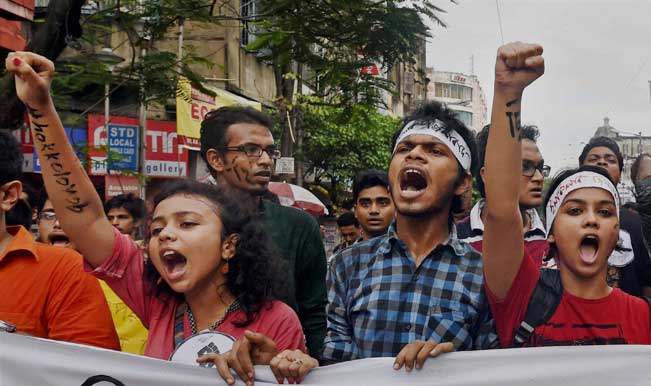Of numerous problems in Kashmir, harassment still remains to be talked about. Women find a window of opportunity in workshops and seminars. Sometimes they discuss it with friends or siblings.
But rarely do they gather to raise a collective voice against it. When they do, the responses are varied.
In June last year, a group of engineering students at the Zakura campus of Kashmir University, located at a distance not more than 2.5 km from the main campus of the Kashmir University, decided to break the silence on the harassment they had been experiencing from a teaching staff for a year.
The students boycotted the classes and demanded the removal of a member of contractual teaching staff at the campus who had allegedly been harassing them. He would allegedly send them unnecessary messages whenever he wished. “He texted me one evening saying that I had failed in my mathematics paper because I had not replied to his earlier texts,” alleges a female student.
This was not the only time when he had attempted to elicit undue favours from his students. They allege that he would call them to his cabin for no reason and if anyone failed to turn up, he would humiliate her in class.
The repeated behaviour ultimately compelled the students to disclose his activities to the administration. In response, a committee, comprising of three men and one woman, was constituted to verify the allegations of the students.
“We were told that if the allegations are found wrong, our parents would be called and a disciplinary action would be initiated against us and if the allegations were true, the teacher would be suspended,” says a student.
Two days later, the committee came with a report of their findings. The report did not mention the word harassment anywhere to describe the behaviour of the teacher. The students were also never shown a copy of that report. It was only read out to them by one of the members of the committee. It mentions that the alleged teacher does not “deny the allegations but could not recall any such incident either”.
A day later, the accused teacher returned to the campus, forsaking any sense of remorse and declared it during his class elsewhere that he had been reinstated.
While speaking to local media, the Dean of Engineering Colleges, Prof. Arif Wani said that “I know nothing about this. I have received no report. Nobody is protesting here”.
The Dean of Colleges, Prof. Neelofar Khan, who was also on the committee to inquire the charges of harassment, said that “The committee could not ascertain the character assassination of the teacher but recommended that the teacher be shifted.”
This was the consequence of over a ten-day protest by the student bodies.
The authorities put an immense pressure on the students to call off their protests and the students eventually were forced to return to class.
The authorities sent out letters to parents of the three students asking them to visit the campus. During the meeting, the parents were told that their wards had been disturbing the peace at campus and were forcing students to leave the classes.
“We were threatened of suspension. Our parents were also made to write apology letters on our behalf,” says a student.
“My parents were told that if there had been a problem, I should have told them (the parents) and then they should have approached the authorities, not the students,” says a student whose parents were called to the campus.
The accused teacher is currently teaching classes other than the class of students that complained against him.
“No one is satisfied with the action taken by the authorities but we are helpless.”
The problem in the Kashmir University campus is not the absence of a Gender Sensitization Committee Against Sexual Harassment (GSCASH) or an Internal Complaints Committee (ICC), it is the confusion over its presence and its stealth presence.
In response to a Right to Information writ seeking information regarding the presence of gender sensitization cell and complaints received regarding issues related to gender, it was revealed that University did not have any such mechanism in place to address to gender related issues untll 10 May 2016. However, on 25 April, 2016 the University Council finally did approve the adoption of a GSCASH. The response to the RTI writ also ascertains the presence of a Women Empowerment And Grievance Committee in the university but does not mention anything about the date of inception.
Prof. Neelofar Khan, who heads the committee does not exactly remember the date of inception either, but believes that it has successfully been able to address the grievances of all the complainants. However, the interactions with the students and the faculty reveal that they have never even heard of any such committees in the campus. And the few of those who have complained have not been satisfied with the redressal mechanisms. Ignorance about the provisions remains prevalent.
Khan says that they have put up all the information on the official website of the University. The website, however, mentions nothing about presence of any such committee in the campus. It only has a general grievance cell online that does not focus on gender-related issues in particular.
The grievances posted online do not maintain anonymity of the complainant and requires grievances to be mentioned publicly which most of the complainants would not prefer, especially with sexual harassment complaints.
So where then, does that leave the space for discussing harassment?
Too often many girls I speak to about the harassment on campus have their stories to share. These stories are shared years they have happened.
The students of Engineering College, Kashmir University will remember the college days with this blot. They tried to lay the foundation of this debate which needs to be carried forward. They took a step in the direction of progress, but the institution was apparently not ready to break the glass ceiling.
About the author(s)
A teacher and a learner.




